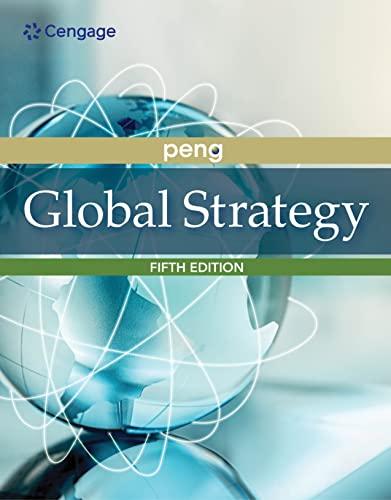Market opening throughout emerging economies often means the arrival of multinational enterprises (MNEs) from developed economies. Although
Question:
Market opening throughout emerging economies often means the arrival of multinational enterprises (MNEs) from developed economies. Although MNEs put enormous pressure on local firms, MNEs also serve a useful purpose of demonstrating what is possible and motivating local firms to try harder. Because the best defense is offense, trying harder—in addition to mounting a rigorous defense—usually means getting out of local firms’ increasingly crowded home markets. How do firms from emerging economies fight back? Specifically, how do they enter foreign markets?
At least four strategic patterns have emerged. The first is to follow the well-known Japanese and Korean strategies of first establishing a beachhead by exporting something good enough and then raising quality, perception, and price. By following these steps, Pearl River of China has dethroned Yamaha to become the largest piano maker in the world. It has also significantly improved quality so that the high-end market leader Steinway, after first rejecting Pearl River for an alliance proposal, more recently approached Pearl River to become Steinway’s original equipment manufacturer for low-end models. Pearl River also acquired Ritmüller, a 300-year-old German piano maker that had been inactive for several decades. Likewise, Mahindra & Mahindra of India solidly established itself in the American heartland, and ended up becoming the world’s largest tractor maker by volume.
A second path is to follow the diaspora. To bring Bollywood hits to the diaspora, Reliance Media of India launched the BIG Cinemas chain in the United States. King of fast food in the Philippines, Jollibee chased the diaspora by expanding to Hong Kong, Dubai, and Southern California.
But joining the mainstream has been hard for companies focusing on the diaspora. More interesting is a reverse diaspora strategy. Corona beer of Mexico, after giving American drinkers a happy time when vacationing in Mexico, successfully chased such customers back home. Corona is now one of the most frequently served beers in American bars and restaurants that have nothing to do with Mexico or Mexican food. In short, Corona has “gone native” to become a local beer in the United States.
Third, some emerging multinationals simply buy foreign companies or brands off the shelf. For example, Tata Motors of India bought Jaguar Land Rover, Geely of China acquired Volvo, and Yildiz Holdings of Turkey took over Godiva. Such high-profile acquisitions significantly enhanced the global profile and brand awareness of these ambitious firms from emerging economies.
Finally, firms from emerging economies have to overcome enormous institution-based barriers, some formal and some informal. Although Huawei of China successfully exported telecom equipment to 45 of the world’s top 50 telecom operators, it had a hard time penetrating the remaining five, all of which are in the United States. A major reason is blatant discrimination by the US government, which labeled Huawei a “national security threat” in the absence of hard evidence. In addition to formal barriers, how to overcome informal consumer perceptions that typically associate emerging economies with poor quality is another challenge. For example, cosmetics users in the world do not think of Brazil highly—or even think of Brazil at all. Natura of Brazil has no precedents to follow because no Brazilian consumer products brands have succeeded outside Latin America. Highlighting its natural ingredients from the Amazon rainforest, Natura endeavored to tap into Brazil’s positive country-of-origin image of biodiversity. This reigning queen of cosmetics in Brazil was trying hard to show its charm overseas.
In summary, facing an onslaught of MNEs from developed economies, many firms from emerging economies are determined to fight back by turning up the competitive heat in developed economies as well as in numerous other markets. How these emerging multinationals succeed or fail will help write the next chapter on international entry.
CASE DISCUSSION QUESTIONS:
1. Why are firms from emerging economies so eager to expand from their home markets?
2. What distinguishes firm-specific resources and capabilities of some of the winning firms from emerging economies?
3. Are the institution-based barriers in some developed economies fair or unfair? How can firms from emerging economies overcome such liability of foreignness?
Step by Step Answer:






